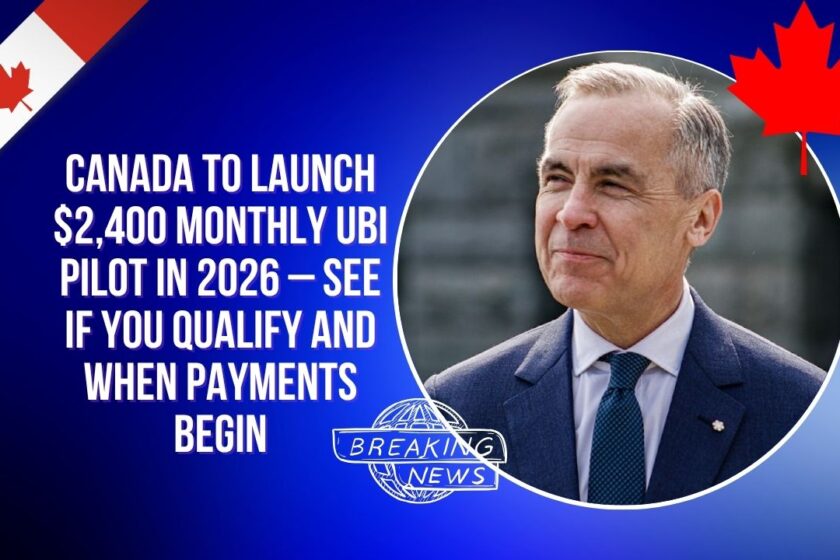The Universal Basic Income pilot is a federally funded initiative designed to evaluate the impacts of unconditional monthly payments. Unlike traditional welfare, the UBI payments will be tax-free and provided without any need to work or meet specific criteria.
Funds will be directly deposited into participants’ bank accounts, giving them complete control over how to use the money—whether for housing, food, education, savings, or family expenses.
Who Will Qualify for the 2026 UBI Pilot?
The program targets low- and middle-income Canadians, with a focus on ensuring diversity and inclusion. Initial selection will cover certain provinces, especially Ontario and British Columbia, and emphasize support for underrepresented groups.
Preliminary Eligibility Criteria
| Criteria | Details |
|---|---|
| Age | Must be 18 years or older |
| Income | Earning less than $30,000/year |
| Residency | Reside in selected provinces (e.g., ON, BC) |
| Current Benefits | Must not be receiving equivalent federal aid |
| Demographics | Focus on Indigenous peoples, newcomers, and persons with disabilities |
Full eligibility guidelines will be released in early 2026 following the passage of enabling legislation.
How Much Will Participants Receive Monthly?
The pilot will run for two years (24 months). Payments will be tax-free, adjusted based on household composition, and designed to complement, not replace, employment income.
Estimated UBI Payment Structure
| Household Type | Monthly Payment | Taxable? | Eligibility Condition |
|---|---|---|---|
| Single Adult | $1,200 | No | Income < $30,000/year |
| Couple (No Children) | $2,000 | No | Joint income < $50,000/year |
| Family with Children | $1,800–$2,400 | No | Based on dependents and income level |
The pilot encourages employment, education, or volunteering, as recipients will not lose benefits if they choose to work.
Why Is Canada Launching UBI in 2026?
The government is responding to increasing economic inequality, job insecurity, and rising living costs. The UBI pilot seeks to:
- Reduce poverty and financial stress
- Simplify welfare systems
- Support education, caregiving, and community contributions
- Offer data-driven insights for long-term social policy reform
Supporters argue that UBI promotes dignity and autonomy, while skeptics voice concerns about costs and potential work disincentives. This pilot will help address both views with real-world evidence.
How This UBI Pilot Differs from Previous Efforts
Although Canada has previously explored basic income—such as Ontario’s 2017 trial—the 2026 UBI pilot introduces several major enhancements.
Notable Improvements in the 2026 UBI Program
- National coordination and federal funding
- Bipartisan political backing for stability
- Wider participant pool across provinces
- Inclusion of diverse populations, including Indigenous and disabled individuals
- Voluntary tracking of employment, health, and financial data
- Two-year duration with transparent milestones and progress updates
This isn’t just about temporary aid—it’s about testing long-term policy transformation.
What Will the Government Evaluate?
The pilot is designed to observe key outcomes when people are granted income security regardless of job status:
- Employment trends: Will people quit or seek better work?
- Health impact: Will financial stability improve mental and physical health?
- Education: Will more people pursue skills training or education?
- Spending behavior: How will recipients allocate their funds over time?
These insights could reshape how future Canadian social programs are designed and implemented.
Will UBI Payments Affect Other Government Benefits?
One major advantage is that UBI will not replace existing government benefits. Payments will be non-taxable and won’t impact eligibility for most current federal or provincial aid programs.
Participants may still receive:
- Canada Child Benefit
- GST/HST Credit
- Provincial housing or disability assistance
This ensures that UBI functions as additional financial support, not a substitute.
Can Participants Continue Working While Receiving UBI?
Absolutely. Participants are encouraged to work, study, or volunteer while receiving the monthly payments.
The pilot aims to explore how individuals act when work is decoupled from income. Instead of discouraging employment, UBI may reduce burnout and offer people the freedom to pursue meaningful activities such as caregiving or community service.
Conclusion
The Canada Universal Basic Income Pilot 2026 marks a pivotal moment in the country’s approach to income support. With a focus on inclusion, financial empowerment, and evidence-based policy, this pilot may shape the future of social security in Canada. As the government gathers data on its impacts across health, employment, and education, the findings could influence wider reforms in the national support system for years to come.
Frequently Asked Questions
What is the main purpose of the 2026 UBI pilot in Canada?
The pilot aims to evaluate the effects of unconditional monthly income on financial stability, health, employment, and education. It will help policymakers decide if UBI should become part of Canada’s long-term welfare model.
Will the UBI payments be taxed or reduce my other benefits?
No. UBI payments will be tax-free and will not impact your eligibility for most other federal or provincial programs like the Canada Child Benefit or GST/HST Credit.
Who qualifies for the Universal Basic Income Pilot?
To qualify, individuals must be 18 or older, earn less than $30,000 annually, reside in selected provinces, and must not already receive equivalent federal aid. Diversity and inclusion are key in participant selection.
Can I still work or study while receiving UBI?
Yes, participants are encouraged to work, pursue education, or volunteer. The program is designed to evaluate how financial freedom affects people’s choices without the pressure of income loss.
When and where will the pilot be implemented?
The Canada UBI Pilot will launch in 2026, primarily in Ontario and British Columbia, with more details on specific regions and rollout timelines expected early in the year.
